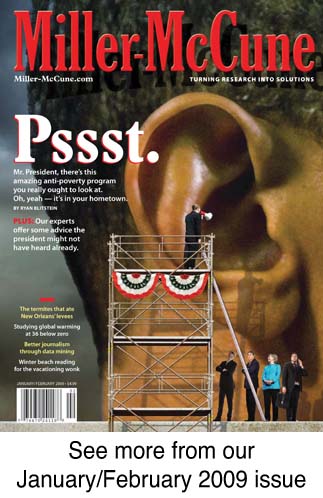Food, food everywhere, but not a bite to eat. That’s the situation health-conscious residents of many urban low-income neighborhoods find themselves in due to a glut of fast-food restaurants and a lack of actual grocery stores (see “The ‘Silent Tsunami’ Food Crisis in America”). Public health officials warn that consumers who lack access to supermarkets are less likely to eat balanced meals. Obesity becomes almost inevitable when the only source of nutrition nearby is the local Greaseburger outlet.
Last summer, the city of Los Angeles declared a yearlong moratorium on the opening of new fast-food restaurants in the South Los Angeles area. Critics called the legislation heavy-handed and paternalistic — Big Brother banning breakfast burritos. But a separate measure passed by the City Council, which provides economic incentives for new grocery and produce markets in the area, received widespread support.

Given current economic conditions, few supermarket chains are looking to expand. But the incentives to move into South L.A. — “a neighborhood hungry for options,” according to the colorful brochure the city recently produced — are as tempting as a ripe strawberry. They include several types of tax credits, low-interest loans and discounts of up to 35 percent on electricity rates. It looks like a plan that will bear fruit — and, one hopes, vegetables.
Multicultural Math
Two University of Arkansas researchers were charged with political incorrectness last year when they suggested American students perform poorly at math because their teachers are too busy taking classes in multicultural awareness to truly learn the subject. While they later admitted their paper was meant to be provocative and at least slightly tongue-in-cheek (see “Too Much Multiculturalism, Not Enough Math?”), their discussion of diversity and decimal points did call attention to a largely forgotten problem.
Now it appears that diversity and math may be converging. According to The Boston Globe, more than 900 students from all over China arrived in Beijing this fall for the first Shing-Tung Yau High School Mathematics Awards, named for the Harvard University math professor who organized the event. Also in attendance was Harvard admissions dean William Fitzsimmons, who was on the lookout for young math whizzes he could entice to the Cambridge campus.
Harry Lewis, a Harvard computer science professor, complained to the newspaper that this new emphasis on recruiting students from abroad would make it more difficult for Americans to be admitted to the prestigious university. But he acknowledged that “we’re not alarmed enough in this country about the lack of interest and motivation we’re giving to math education here.”
Mormons Who Fear Polygamy … and Gay Marriage
The ongoing debate over the legalization of same-sex marriage (see “Modern Marriage: Standing on Ceremony”) has produced a truly striking irony. As we reported last summer, James Dobson, founder of Focus on the Family and a leading cultural conservative, has written that “the introduction of legalized gay marriage will inexorably lead to polygamy.” He reasons that once the definition of marriage is expanded beyond the traditional man-woman pairing, other barriers will inevitably fall, and a wide variety of once-scorned unions will gain acceptance — including those among more than two partners.
Such slippery-slope arguments apparently convinced voters in Arizona, Florida and California, the three states that approved constitutional amendments banning gay marriage this past November. Gay marriages are now legal in two states —Massachusetts and Connecticut — and constitutionally banned in 29 others.
The notion of same-sex marriage is problematic to many churches, but it is anathema to Mormons. In June, the top leaders of that faith issued a letter, read in every California congregation, that instructed members to “do all you can to support” the anti-gay-marriage initiative by donating “your means and time.” Although some congregants expressed dissenting views in the media, many of those in the pews clearly followed through: Church members donated an estimated $15 million to $20 million to the successful effort.
The Mormon Church is in an odd position to advocate a strict interpretation of traditional marriage. Joseph Smith, who founded the religion in the 1840s, had multiple wives; he declared “plural marriage” was ordained by God as sacred (information he received in a divine revelation). The church disavowed polygamy after his death, but members of offshoot sects continue the tradition. So in furthering gay marriage bans, the Mormon faithful helped save America from a development that could — at least in a theoretical, worst-case scenario — ultimately lead to the legalization of a practice that was embraced by the founder of their church.
Sugar. Uh, Money, Money. The ambitious plan announced by Florida officials in June to restore the Everglades to their natural state always seemed somewhat overstated to experts (see “Restoration: You Can’t Get There From Here”). Environmentalists applauded the idea of buying out the U.S. Sugar company and reclaiming its 180,000 acres of cropland, but they added that “rehabilitation” or “repair” is a more accurate description of the project, since an actual “restoration” to a pristine, pre-industrial state isn’t really possible.

In November, a flurry of activity suggested just how complicated this effort is going to be. First, the buyout was reduced $410 million to $1.34 billion, and the state announced U.S. Sugar would retain its mill, citrus processing facilities and other assets. Robert Coker, a senior vice president with the nation’s largest sugar producer, emphasized the long-term nature of the project, telling The New York Times his company expects to keep growing sugar on the land for at least the next decade.
Two days later, an environmental assessment was released reporting varying concentrations of copper, selenium, DDT and other agro-chemicals on the cropland to be purchased. The cleanup could cost anywhere from $18 million to $119 million, with the state picking up most of the tab.
Newspaper editorials in Florida responded to the altered proposal with caution. The Palm Beach Post wrote it is unclear whether the plan can succeed, noting that “almost 40,000 acres that could be in the way of water flowing to the Everglades belong to other sugar growers.” The Orlando Sentinel was more optimistic, suggesting that growers could swap land to ensure a sufficient water flow. The paper added, however, that the deal “won’t create the marshes or the reservoirs. That will take billions more dollars. One place to find them is in Washington.”
So sugar may be phased out, but only with the help of a sugar daddy.
Offline Diary expands on stories posted to Miller-McCune.com, where comments, complaints and questions are not just welcome but mandated by Congress.
Sign up for our free e-newsletter.
Are you on Facebook? Click here to become our fan.




